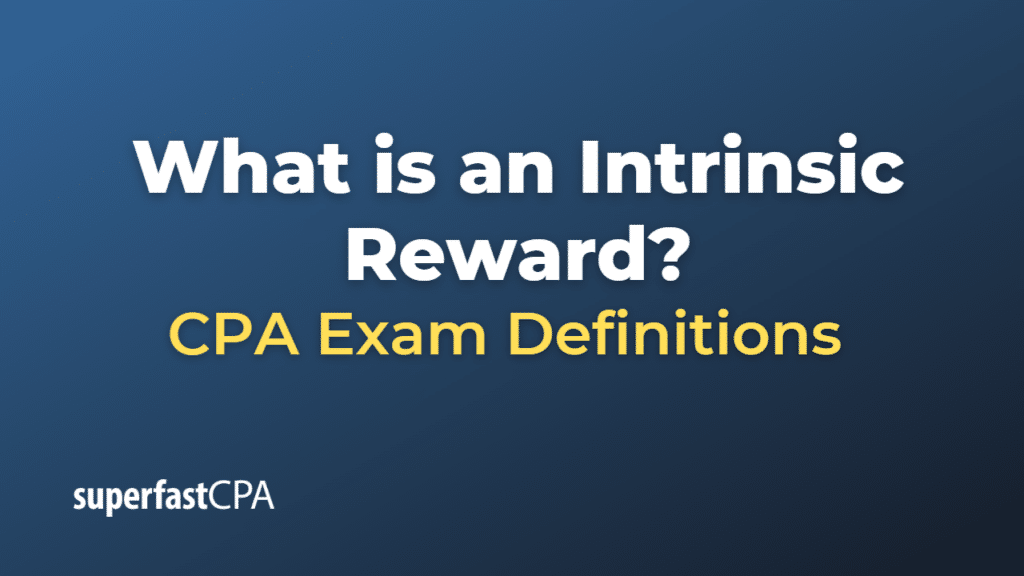Intrinsic Reward
Intrinsic rewards in accounting, as in any field, refer to the personal satisfaction and fulfillment that individuals derive from their work, rather than from external motivators like money or status. In the context of accounting, intrinsic rewards can be particularly significant due to the nature of the work, which often involves attention to detail, adherence to strict standards, and a significant amount of autonomy. Here are some examples of intrinsic rewards that accountants might experience:
- Sense of Accomplishment: Completing complex financial reports, audits, or tax filings accurately and on time can provide a significant sense of achievement.
- Problem-Solving Satisfaction: Accountants often face complex financial puzzles. Solving these challenges can be intellectually stimulating and rewarding.
- Professional Growth: Continuous learning in accounting, whether it’s about new tax laws, accounting standards, or financial strategies, can be intrinsically rewarding for those who value personal development and expertise.
- Ethical Pride: Upholding high ethical standards and knowing that their work contributes to the transparency and honesty of financial reporting can be a source of pride for accountants.
- Contribution to Success: Understanding that their work directly contributes to the financial health and decision-making process of an organization can be very fulfilling.
- Autonomy and Independence: Accountants often have the opportunity to work independently, making decisions and managing their workload, which can be inherently satisfying for those who value autonomy.
- Recognition and Respect: While this can border on extrinsic motivation, the respect and professional recognition from colleagues and clients for one’s expertise and reliability can also be a source of intrinsic satisfaction.
- Interest in the Field: Simply having a natural interest or passion for finance, numbers, and economic systems can make the work itself rewarding.
Intrinsic rewards are crucial for long-term career satisfaction and motivation, particularly in fields like accounting, where the work can sometimes be meticulous and demanding. They help professionals maintain a high level of engagement and commitment to their role and the broader goals of their organization or clients.
Example of an Intrinsic Reward
Let’s consider an example of an intrinsic reward in accounting through a scenario involving an accountant named Sarah:
Sarah is a senior accountant at a medium-sized firm. She has been tasked with analyzing and restructuring the company’s budget to make it more efficient and to identify potential areas for cost savings.
Process:
- Sarah starts by meticulously reviewing all the company’s financial statements and budget reports from the past few years.
- She identifies several areas where expenses can be reduced without impacting the company’s operations.
- Sarah also proposes a new budgeting strategy that includes a more detailed tracking system for expenses and revenues.
- She works closely with different department heads to understand their financial needs and constraints.
Intrinsic Rewards Experienced by Sarah:
- Intellectual Stimulation: Sarah finds joy in the analytical aspect of her work. She loves diving into numbers and uncovering patterns that aren’t immediately obvious. The process of dissecting financial statements and developing new strategies is intellectually rewarding for her.
- Sense of Achievement: After weeks of hard work, Sarah successfully presents her new budget plan to the company’s executives. The plan is well-received, and the company decides to implement her suggestions. The feeling of seeing her ideas accepted and put into action gives Sarah a profound sense of accomplishment.
- Professional Growth : Through this exercise, Sarah learns new budgeting techniques and improves her skills in financial analysis and strategic planning. This contributes to her professional development and deepens her expertise, which she finds personally fulfilling.
- Ethical Satisfaction: Sarah’s new budget plan not only saves the company money but also allocates resources more efficiently and responsibly. Knowing that her work has a direct positive impact on the company’s financial health and ethical standards provides her with a strong sense of pride and ethical satisfaction.
- Contribution to Organizational Success: By optimizing the budget, Sarah plays a crucial role in the financial stability and success of her company. This gives her a sense of being an integral part of the organization’s achievements.
In this example, Sarah’s intrinsic rewards are derived from the intellectual challenge, the sense of accomplishment from her achievements, her professional growth, the ethical aspects of her work, and her contribution to the company’s success. These factors motivate her and provide satisfaction beyond any external rewards like salary or bonuses.













